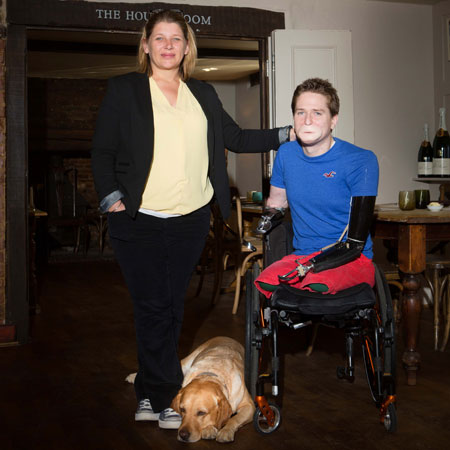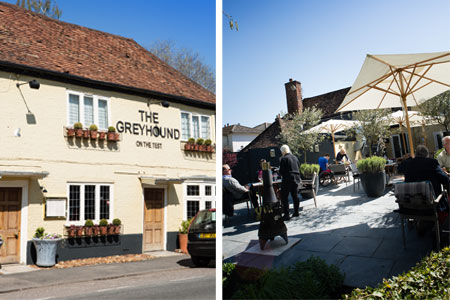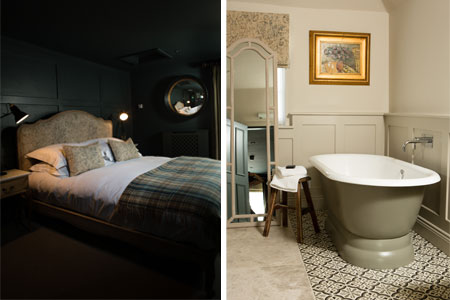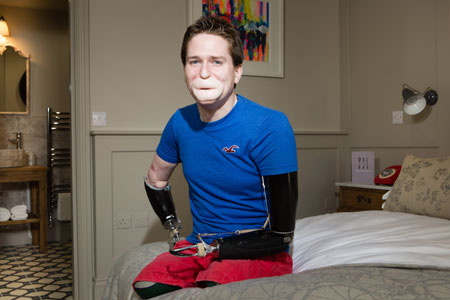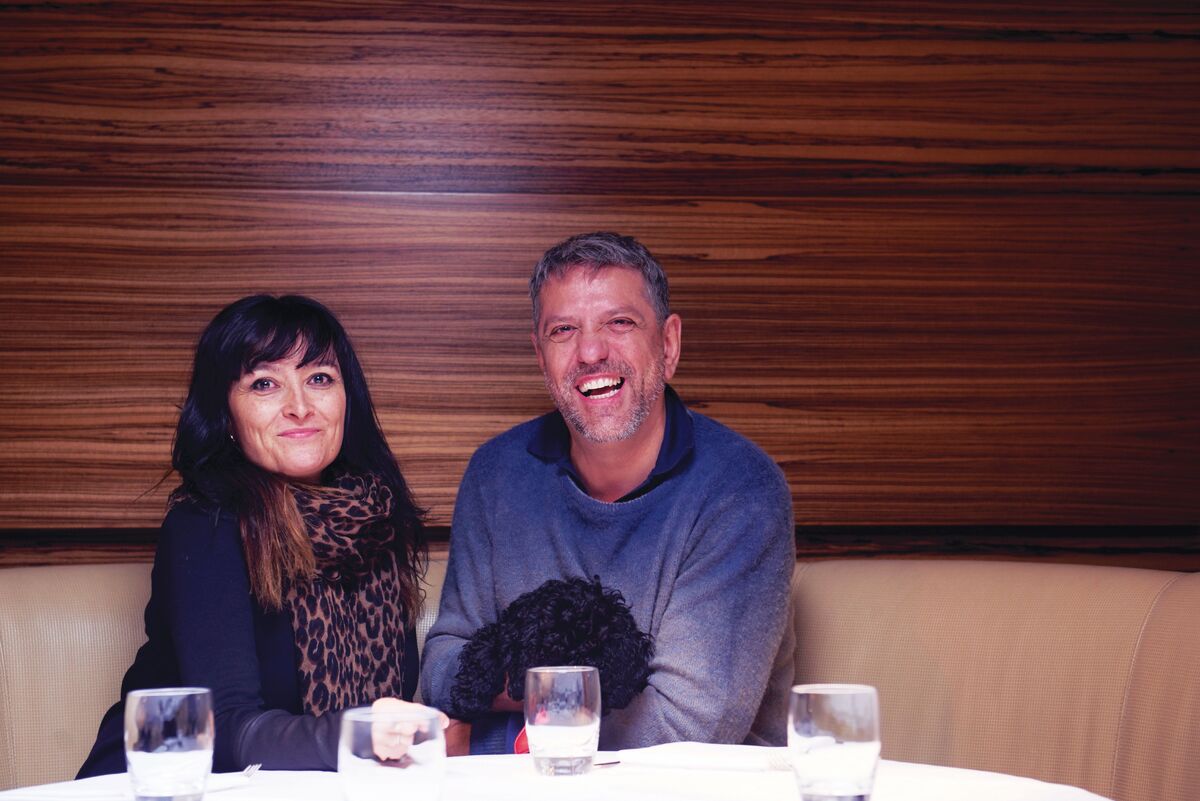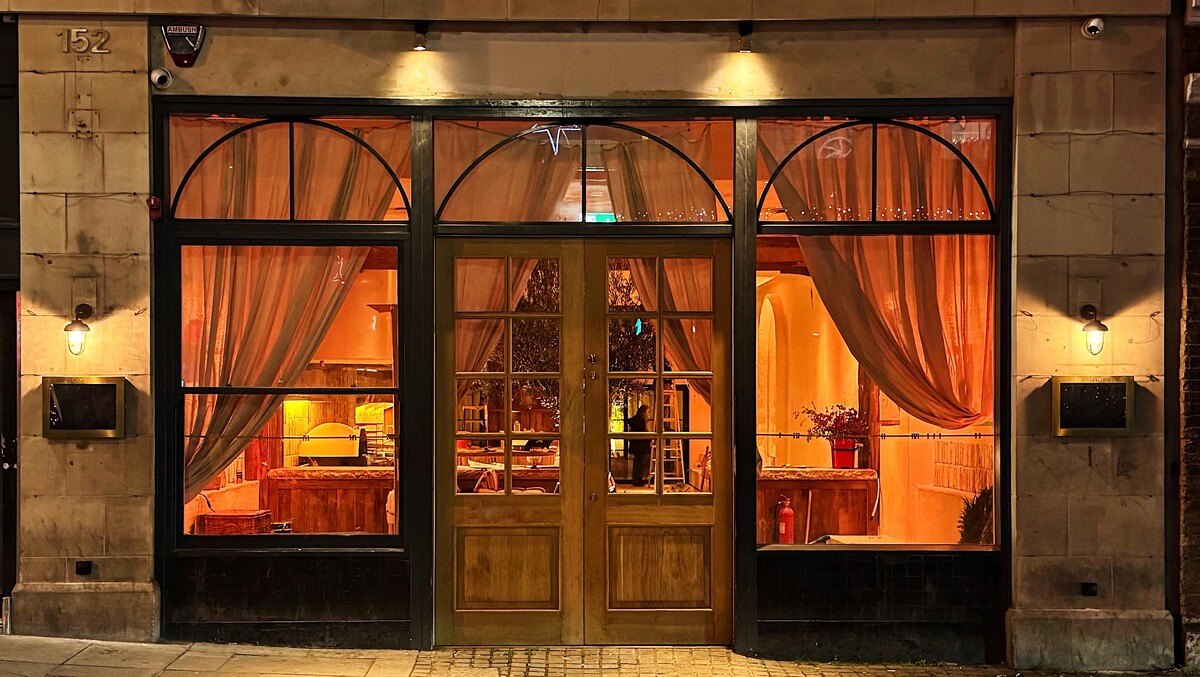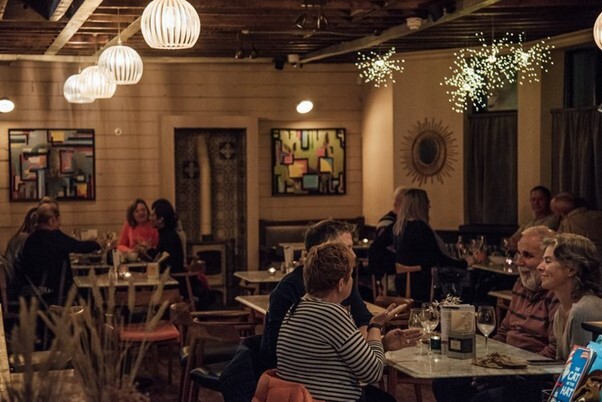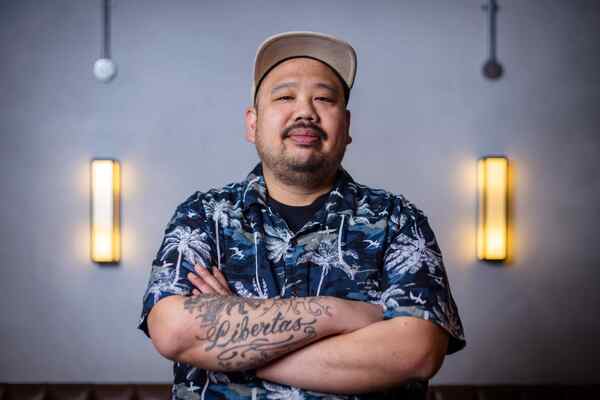Business: How Alex Lewis turned illness into inspiration at The Greyhound on the Test
When Alex Lewis, one half of the team behind the Greyhound on the Test pub fell ill, he was given a 3% chance of survival. But despite losing four limbs to the illness, his steadfast refusal to give up is an inspiration. Tom Vaughan reports
It all started with a common cold. When Alex Lewis went to bed one November evening, he had a sore throat; by 10.30am the next morning, he was in intensive care, his organs shutting down one by one as a group A streptococcus bacterial infection took hold. Normally harmless, in Lewis's case the infection combined with the cold to prompt a case of toxic shock syndrome that would eventually take his limbs, lips and nose.
"We still have no idea how or why it happened; we are none the wiser," says Lewis, one half of the team behind the Greyhound on the Test, a two-AA-rosette pub and restaurant with seven bedrooms in Stockbridge, Hampshire.
"The strep A combined with the cold had started breaking down my internal organs. I was given a 3% chance of survival when I was on life support."
Lewis, who runs the Greyhound with fiancée Lucy Townsend, is sitting in his wheelchair, reflecting on 17 rollercoaster months since the illness took hold. In that time he has survived against the odds, undergone pioneering (but ultimately unnecessary) surgery to (unsuccessfully) save an arm and experienced four amputations, before going back to helping establish the Greyhound as one of the south of England's most sought-after destination pubs, and setting up the Alex Lewis Trust.
Up to that point, Lewis â" a builder and interior designer by trade â" was a healthy 32-year-old who looked after all the design and interior work on the two pubs they owned at the time: former Michelin Pub of the Year the Greyhound and the Kingâs Arms in nearby Lockerley. Day-to-day operations were run by Townsend, a Hotel du Vin and Marco Pierre White alumna.
Seven weeks in intensive care followed, during which time Lewisâs limbs slowly died as the capillaries shut down ahead of the strep A and dry gangrene set in. âI watched my feet die from the toes upwards,â he says. âI was always aware that Iâd lose my feet and my lower leg, and I was hoping they could save my knee joint, but over time it went way beyond that.â
âWe had the discussion that if you had to lose any limb, what would it be, and we agreed on legs â" Alex loves writing and golf and cooking,â says Townsend. âWhen he got told hewas going to lose his arm, it was harder and we had to get a counsellor involved.â
His left arm was the first to go, with the strep A racing up towards the shoulder joint. The worry was that it might reach his heart before they acted.
His right arm was saved by 17-hour operation that opened up the limb from shoulder to wrist, scraped away the dead muscle and fused in new muscle and skin from his shoulder. However, it wouldnât last â" a year later, following his first night out in London since the illness, he slept on the
weakened arm and shattered it.
âBy then it was just like, âOh, go on, take another limbâ,â says Townsend. âAl had an infection in the arm and if it hadnât have been noticed, it would have gone up the limb and he might have lost above the elbow.â
The reality bites
Lying in intensive care as a triple amputee during those first weeks, being fed through a syringe in his stomach with a cocktail of drugs swirling around his system, did Lewis feel sorry for himself? âNo, not once. I didnât feel sorry for me â" I felt sorry for Lucy and Sam [their two-year-old son] as I felt something had been taken away from them more than me,â he says.
As he got closer and closer to going home, the reality of the situation began to bite. âWhen you are on the ward and in the throes of rehab, youâve got weeks and weeks to think about things â" you feel you are getting better and feeling stronger and at that point you think âCan I go home?â. But at the same time you are petrified. You have never been a triple amputee before, so itâs not like you are going to walk back through the door and everything
is going to be right as rain. The closer I got to going home, the harder it got,â he says.
Yet through all of this, Lewis had one quality on his side, says Townsend: âIn case you didnât notice, Alex is the most laid-back person you will ever meet and nothing seems to get to him.â It is his instantly likeable character that in part explains the extraordinary response of the hospitality industry.
To the relief of both of them, Townsend sold the Kingâs Arms when Lewis fell ill so she could concentrate solely on the Greyhound.
Even then, with crowds flooding in on the back of the Michelin Pub of the Year award and bedrooms to refurbish, as well as Alex and Sam to tend to, Townsendâs ability to hold everything together was remarkable.
âIâve always been a worker and will always work 24/7, but I felt then that this was our future and I had to keep it going. Iâve always had a very strong team around me. Iâve got investors and I remember calling them in and saying that if they felt it was affecting the business at any point to take me out of equation for a while and step in. But they didnât once,â says Townsend.
The industry support has been widespread. âAlex sent an email out when he was in intensive care â" as not a lot of people knew â" saying what was happening,â explains Townsend. âHe asked them to feel sorry for us for five minutes, but then do something practical â" pick up Sam from school or help with the business. Just donât feel sorry for us.
âI remember Robin Hutson sending me an email asking: âDo you need some staff? Do you want me to pull someone in for the weekend?â. Because all my friends are hospitality-based I could lean on them for favours and they were incredible.â
Help from the industry
The support has continued through Lewisâs rehabilitation and the establishment of the Alex Lewis Trust (see panel). âIâve worked in kitchens all my life and I love it,â says Townsend.
âItâs very close-knit. Now Alex is ill, chefs we have known through the years are throwing all these hospitality dinners and offering
to help with the pub. Robin Hutson did a dinner at Lime Wood, Angela Hartnett cooked a dinner at home. Mark Hix came down and did a day; Chewton Glen did an amazing dinner. You wouldnât get it in any other industry. Hospitality is a brilliant trade to be in.â
âItâs very humbling,â says Lewis. âI struggle with it. After the Chewton Glen dinner I found it too much â" I got back to my room and broke down. Itâs so hard to contemplate why they do it. I still donât quite get it and I donât want to get it â" itâs amazing what theyâve done for us.â
As well as continuing to grow his Trust, Lewis aims to be back working at the Greyhound by the end of the year as it continues to expand and diversify (see panel), while further operations will help reconstruct his nose and lips. Yet the biggest change hasnât been coming to terms with his new body, but enjoying their new life.
âIâve always been quite controlling and this has allowed me to step back and realise what my team can do,â says Townsend. âAlex thinks his illness was the best thing that ever happened.â
âThe best thing to come out of this illness is that Lucy has formed a closer relationship with Sam. I was his principle carer and at the start of the Greyhound and â" as with every new business â" we didnât see Lucy for days on end,â says Lewis. âIn so many ways itâs been brilliant. In the way we lived our lives then and live our lives now, I certainly enjoy it more now.â
The Greyhound on the Test
Relaunched in March 2013 by Lucy Townsend and Alex Lewis, the historic inn â" parts of which date back 600 years â" came with prestigious fishing rights to a stretch of the River Test, one of the most sought-after waters for fly-fishers. Since taking it over, the couple have completely refurbished the seven bedrooms, with rates starting at £140.
The British-inspired menu features dishes such as seared scallops, razor clams, mussels, curried samphire, coconut and coriander (£12.95) and Asian influences such as roasted duck breast, duck leg dumpling, duck tea, enoki and pak choi (£23.95).
Townsend, who started her career as a pastry chef, including a stint with Marco Pierre White before moving front of house at the original Hotel du Vin in Winchester, went on to launch her own businesses, such as the Peat Spade Inn in Longstock, Hampshire.
Today, she runs the day-to-day operations at the Greyhound, while Lewis oversees the interiors. Including those needed for the restaurant, rooms and fishing trade, the Greyhound employs 45 people. Meanwhile, Townsend also runs Wilds â" a recently relaunched outdoor catering firm based behind
the pub â" and the couple are in the process of adding three more bedrooms, having purchased the adjoining cottage, where rates will start at £220.
Having previously run multiple sites and being reluctant to do so again, Townsend and Lewis aim to expand and diversify around the Greyhound, starting with a shop selling bread and produce to be based in the siteâs car park.
The Alex Lewis Trust
In the wake of Lewisâs illness, the couple suddenly found themselves inundated with money from fundraisers. âI couldnât get my head around why random people wanted to give us money, so we brought in a lady to help us set up and run a trust,â explains Townsend. The Trust aims to help with the future cost of Lewisâs care, but also to give back to those establishments that helped him in his darkest hours.
âIn my lifetime, we are looking at £1.5m on prosthetics. The NHS just canât afford that, I think, so itâs to fund that, but also to help the hospitals who helped us â" we are donating to those in Salisbury, Southampton and Winchester, as well as buying a couple of exercise bikes for a heart centre in Andover. Weâre also opening up a gym in one of the barns here for people who canât afford gym membership but want to get fit.â
As its profile has grown, Lewis has used the Trustâs clout and his personality to draw awareness to issues affecting amputees, and has become the first-ever non-military person allowed access to the Help the Heroes facilities.
âThe problem we have is that the military has all these facilities available to them, but with no active war, thereâs no new troops coming through,â he says. âMy argument is there are so many amputees who want to get fit and go back to work â" just because youâve lost your legs it doesnât mean youâve lost your head.â
Both the local community and hospitality industry has rallied around the trust, with events including a charity dinner at Chewton Glen that featured James Martin, Michael Caines and Pierre Koffmann, while later this year Lewis will take part in a charity skydive with local ex-servicemen charity Pilgrim Bandits, which raises funds by encouraging injured men and women into demanding situations.
More information about the trust can be found at www.alex-lewis.co.uk/the-trustÂ



